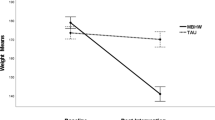Abstract
A physician led wellness group for 45 adults with developmental delay run collaboratively with a day rehabilitation program was evaluated for an effect on weight. A twice weekly empowerment model used to reduce obesity in non-delayed populations was adapted and used as a pilot project. Changes in weight related to specific level of mental retardation (MR), age, sex, frequency of program, length of time in program, starting weight, and participants living situation were investigated. Findings indicated statistically significant weight loss relating to frequency of attendance and female sex. Generally, individuals lost clinically significant amounts of weight (173.12l SD = 35.20, lowered to 2.60 lbs to 170.51 SD +/− 33.63 p = 0.14) that increased with duration and frequency in the program. Level of MR, living situation, and age were not associated with any weight change. Larger studies with a control group for comparisons will be needed to further corroborate these findings.




Similar content being viewed by others
References
Alley, D. E., & Chang, V. W. (2007). The changing relationship of obesity and disability, 1988–2004. Journal of the American Medical Association, 298(17), 2020–2027.
Burkart, J. E., Fox, R. A., & Rotatori, A. F. (1985). Obesity of mentally retarded individuals: Prevalence, characteristics, and intervention. American Journal of Mental Deficiency, 90(3), 303–312.
Chapman, M. J., Craven, M. J., & Chadwick, D. D. (2005). Fighting fit? An evaluation of health practitioner input to improve healthy living and reduce obesity for adults with learning disabilities. Journal of Intellectual Disabilities, 9(2), 131–144.
Dallman, M. F., Pecoraro, N., Akana, S. F., la Fleur, S. E., Gomez, F., Houshyar, H., et al. (2003). Chronic stress and obesity: A new view of “comfort food.”. (Published online) proceedings of the National Academy of Sciences of the United States of America, 100(20), 11696–11701.
Emerson, E. (2005). Underweight, obesity, and exercise among adults with intellectual disabilities in supported accommodation in Northern England. Journal of Intellectual Disability Research, 49(2), 134–143.
Fox, R. A., Haniotes, H., & Rotatori, A. F. (1984). A streamlined weight loss program for moderately retarded adults in a sheltered workshop setting. Applied Research in Mental Retardation, 5(1), 69–79.
Fox, R. A., Rosenberg, R., & Rotatori, A. F. (1985). Parent involvement in a treatment program for obese retarded adults. Journal of Behavior Therapy and Experimental Psychiatry, 16(1), 45–48.
Harris, N., Rosenberg, A., Jangda, S., O’Brien, K., & Gallagher, M. L. (2003). Prevalence of obesity in International Special Olympic athletes as determined by body mass index. Journal of the American Dietetic Association, 103(2), 235–237.
Hove, O. (2004). Weight survey on adult persons with mental retardation living in the community. Research in Developmental Disabilities, 25(1), 9–17.
Jackson, H. J., & Thorbecke, P. J. (1982). Treating obesity of mentally retarded adolescents and adults: And exploratory program. American Journal of Mental Deficiency, 87(3), 302–308.
National Task Force on the Prevention and Treatment of Obesity. (2000). Overweight, obesity, and health risk. Archives of Internal Medicine, 160(7), 898–904.
Pitetti, K. H., Rimmer, J. H., & Fernhall, B. (1993). Physical fitness and adults with mental retardation. An overview of current research and future directions. Sports Medicine, 16(1), 23–56.
Rimmer, J. H., Braddock, D., & Fujiura, G. (1993). Prevalence of obesity in adults with mental retardation: implications for health promotion and disease prevention. Mental Retardation, 31(2), 105–110.
Robertson, J., Emerson, E., Gregory, N., Hatto, C., Turner, S., Kessissoglou, S., et al. (2000). Lifestyle related risk factors for poor health in residential settings for people with intellectual disabilities. Research in Developmental Disabilities, 21(6), 469–486.
Seematter, G., Binnert, C., & Tappy, L. (2005). Stress and metabolism. Metabolic Syndrome and Related Disorders, 3(1), 8–13.
Vasan, R. S., Pencina, M. J., Cobain, M., Freiberg, M. S., & D’Agostino, R. B. (2005). Estimated risks for developing obesity in the Framingham Heart Study. Annals of Internal Medicine, 143(7), 473–480.
Yamaki, K. (2005). Body weight status among adults with intellectual disability in the community. Mental Retardation, 43(1), 1–10.
Acknowledgements
The Greater Lawrence Family Health Center would like to acknowledge our long standing partnership with CLASS, Inc. This program would not exist but for the commitment of CLASS Inc. to increasing the access of individuals with developmental disabilities to health and wellness instruction and resources.
Author information
Authors and Affiliations
Corresponding author
Rights and permissions
About this article
Cite this article
Geller, J.S., Crowley, M. An Empowerment Group Visit Model as Treatment for Obesity in Developmentally Delayed Adults. J Dev Phys Disabil 21, 345–353 (2009). https://doi.org/10.1007/s10882-009-9147-7
Published:
Issue Date:
DOI: https://doi.org/10.1007/s10882-009-9147-7




